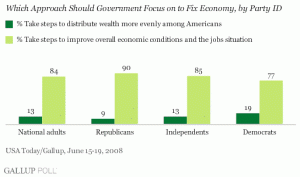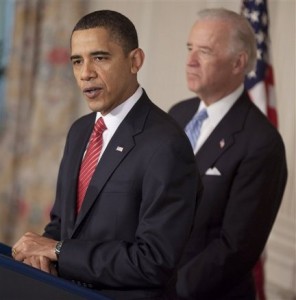
President Obama certainly scored a victory by obtaining the passage of Obamacare, but will the American public support the new massive law as key Democrats admit Obamacare is intended to redistribute wealth?
As the dust settles after the passage of the historic comprehensive health care reform package known as Obamacare, the American public appears to favor its immediate repeal as 54% support such a repeal while 42% oppose repeal:
One week after the House of Representatives passed the health care plan proposed by President Obama and congressional Democrats, 54% of the nation’s likely voters still favor repealing the new law. The latest Rasmussen Reports national telephone survey shows that 42% oppose repeal.
Those figures are virtually unchanged from last week. They include 44% who Strongly Favor repeal and 34% who Strongly Oppose it.
Repeal is favored by 84% of Republicans and 59% of unaffiliated voters. Among white Democrats, 25% favor repeal, but only one percent (1%) of black Democrats share that view.
Americans also simply do not believe the Obama health care talking points, strongly repudiating the main claims made by Obama about the benefits of Obamacare by a wide margin:
Only 17% of all voters believe the plan will achieve one of its primary goals and reduce the cost of health care. Most (55%) believe it will have the opposite affect and increase the cost of care.
Forty-nine percent (49%) believe the new law will reduce the quality of care. Sixty percent (60%) believe it will increase the federal budget deficit. Those numbers are consistent with expectations before the bill was passed.
Scott Rasmussen, president of Rasmussen Reports, notes that “the overriding tone of the data is that passage of the legislation has not changed anything. Those who opposed the bill before it passed now want to repeal it. Those who supported the legislation oppose repealing it.”
As noted by Scott Rasmussen above, little has changed regarding public opinion Obamacare since its passage, repudiating the media’s “conventional wisdom” that the Democrats would see a surge in public support after its passage. The ABC/Washington Post poll confirms Rasmussen’s findings that few Americans believe Obama’s health care talking points and that majority opposition continues that is “virtually identical to the pre-vote split” regarding Obamacare:
More people see the changes as making things worse, rather than better, for the country’s health-care system, for the quality of their care and, among the insured, for their coverage. Majorities in the new poll also see the changes as resulting in higher costs for themselves and for the country.
Most respondents said reform will require everyone to make changes, whether they want to or not; only about a third said they believe the Democrats’ contention that people who have coverage will be able to keep it without alterations. And nearly two-thirds see the changes as increasing the federal budget deficit, with few thinking the deficit will shrink as a result. The Congressional Budget Office said the measure will reduce the deficit.
About half of all poll respondents said the plan creates “too much government involvement” in the health-care system, a concern that is especially pronounced among Republicans.
Senior citizens, who typically make up about one in five midterm voters, represent a particularly valuable but tough audience on this issue. More than six in 10 of those 65 or older see a weaker Medicare system as a result of the changes to the health-care system. Overall, seniors tilt heavily against the changes, with 58 percent opposed and strong opponents outnumbering strong supporters by a 2-to-1 ratio.
Considering these numbers, President Obama has a steep uphill climb to convince Americans that this broad claims that Obamacare will be a “historic” deficit reduction plan, that Americans can keep their doctor and plan if they like it, and that Obamacare will reduce costs and increase the quality of American health care. Key Democrats are not making the President’s job easier by explicitly stating that the true intent of Obamacare is to redistribute wealth in America, something that went unmentioned by Democrats prior to the passage of Obamacare.

Americans strongly oppose, by a 84%-14% margin, government policies that attempt to bring about wealth redistribution in the American economy
Indeed, such wealth redistribution policies are strongly rejected by Americans, with 84% rejecting that approach according to Gallup:
When given a choice about how government should address the numerous economic difficulties facing today’s consumer, Americans overwhelmingly — by 84% to 13% — prefer that the government focus on improving overall economic conditions and the jobs situation in the United States as opposed to taking steps to distribute wealth more evenly among Americans.
First, Democratic Senator Max Baucus (D-MT) announced that Obamacare is intended to redistribute wealth:
It seems Senator Max Baucus let slip the real purpose of health care reform efforts – the redistribution of wealth from the rich to the poor. Baucus said of the health care bill, “This legislation will have the effect of addressing that mal-distribution of income in America.” According to the influential Chairman of the Senate Finance Committee, “The last couple three years, the mal-distribution of income in American is gone up way too much, the wealthy are getting way, way too wealthy and the middle income class is left behind.”
Former DNC Chairman Howard Dean then chipped in on Thursday March 25, 2010 by admitting that “this is a form of redistribution” and Obamacare is intended to cause wealth redistribution in the American economy because the economy is “like a machine. You always got to tune it right.” Of course, as the establishment media is well aware such explicit Democratic admissions that Obamacare is intended to tinker with the economy to bring about wealth redistribution would be damaging to Obamacare’s popularity, so the claims of Dean and Baucus have gone virtually unreported in the media. However, Americans continue to oppose the Obamacare package, as evidenced by today’s poll showing 54% favor its repeal.


